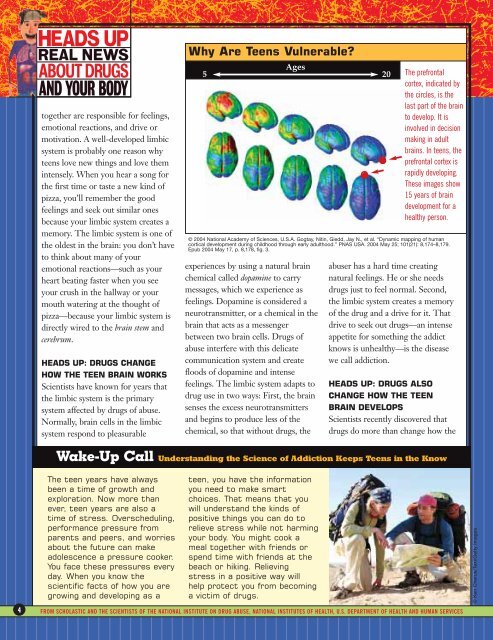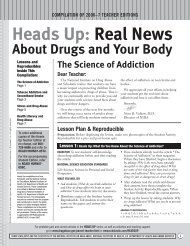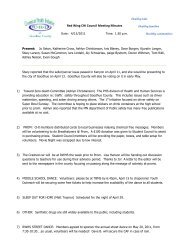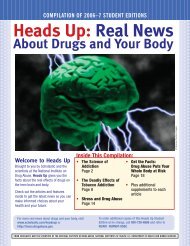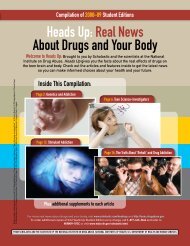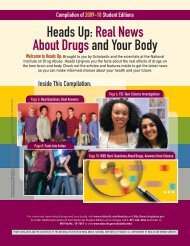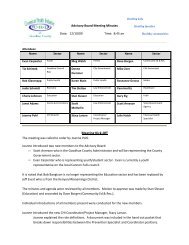Heads Up: Real News About Drugs and Your Body, a ... - Scholastic
Heads Up: Real News About Drugs and Your Body, a ... - Scholastic
Heads Up: Real News About Drugs and Your Body, a ... - Scholastic
Create successful ePaper yourself
Turn your PDF publications into a flip-book with our unique Google optimized e-Paper software.
together are responsible for feelings,<br />
emotional reactions, <strong>and</strong> drive or<br />
motivation. A well-developed limbic<br />
system is probably one reason why<br />
teens love new things <strong>and</strong> love them<br />
intensely. When you hear a song for<br />
the first time or taste a new kind of<br />
pizza, you’ll remember the good<br />
feelings <strong>and</strong> seek out similar ones<br />
because your limbic system creates a<br />
memory. The limbic system is one of<br />
the oldest in the brain: you don’t have<br />
to think about many of your<br />
emotional reactions—such as your<br />
heart beating faster when you see<br />
your crush in the hallway or your<br />
mouth watering at the thought of<br />
pizza—because your limbic system is<br />
directly wired to the brain stem <strong>and</strong><br />
cerebrum.<br />
HEADS UP: DRUGS CHANGE<br />
HOW THE TEEN BRAIN WORKS<br />
Scientists have known for years that<br />
the limbic system is the primary<br />
system affected by drugs of abuse.<br />
Normally, brain cells in the limbic<br />
system respond to pleasurable<br />
Why Are Teens Vulnerable?<br />
5<br />
Ages<br />
experiences by using a natural brain<br />
chemical called dopamine to carry<br />
messages, which we experience as<br />
feelings. Dopamine is considered a<br />
neurotransmitter, or a chemical in the<br />
brain that acts as a messenger<br />
between two brain cells. <strong>Drugs</strong> of<br />
abuse interfere with this delicate<br />
communication system <strong>and</strong> create<br />
floods of dopamine <strong>and</strong> intense<br />
feelings. The limbic system adapts to<br />
drug use in two ways: First, the brain<br />
senses the excess neurotransmitters<br />
<strong>and</strong> begins to produce less of the<br />
chemical, so that without drugs, the<br />
The prefrontal<br />
cortex, indicated by<br />
the circles, is the<br />
last part of the brain<br />
to develop. It is<br />
involved in decision<br />
making in adult<br />
brains. In teens, the<br />
prefrontal cortex is<br />
rapidly developing.<br />
These images show<br />
15 years of brain<br />
development for a<br />
healthy person.<br />
© 2004 National Academy of Sciences, U.S.A. Gogtay, Nitin, Giedd, Jay N., et al. “Dynamic mapping of human<br />
cortical development during childhood through early adulthood.” PNAS USA. 2004 May 25; 101(21): 8,174–8,179.<br />
Epub 2004 May 17, p. 8,178, fig. 3.<br />
20<br />
abuser has a hard time creating<br />
natural feelings. He or she needs<br />
drugs just to feel normal. Second,<br />
the limbic system creates a memory<br />
of the drug <strong>and</strong> a drive for it. That<br />
drive to seek out drugs—an intense<br />
appetite for something the addict<br />
knows is unhealthy—is the disease<br />
we call addiction.<br />
HEADS UP: DRUGS ALSO<br />
CHANGE HOW THE TEEN<br />
BRAIN DEVELOPS<br />
Scientists recently discovered that<br />
drugs do more than change how the<br />
4<br />
Wake-<strong>Up</strong> Call Underst<strong>and</strong>ing the Science of Addiction Keeps Teens in the Know<br />
The teen years have always<br />
been a time of growth <strong>and</strong><br />
exploration. Now more than<br />
ever, teen years are also a<br />
time of stress. Overscheduling,<br />
performance pressure from<br />
parents <strong>and</strong> peers, <strong>and</strong> worries<br />
about the future can make<br />
adolescence a pressure cooker.<br />
You face these pressures every<br />
day. When you know the<br />
scientific facts of how you are<br />
growing <strong>and</strong> developing as a<br />
teen, you have the information<br />
you need to make smart<br />
choices. That means that you<br />
will underst<strong>and</strong> the kinds of<br />
positive things you can do to<br />
relieve stress while not harming<br />
your body. You might cook a<br />
meal together with friends or<br />
spend time with friends at the<br />
beach or hiking. Relieving<br />
stress in a positive way will<br />
help protect you from becoming<br />
a victim of drugs.<br />
FROM SCHOLASTIC AND THE SCIENTISTS OF THE NATIONAL INSTITUTE ON DRUG ABUSE, NATIONAL INSTITUTES OF HEALTH, U.S. DEPARTMENT OF HEALTH AND HUMAN SERVICES<br />
© Ken Cherus/Taxi/Getty Images


